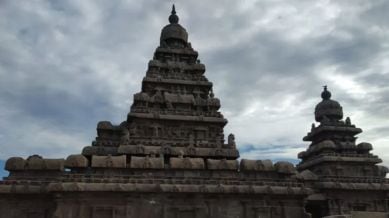Stay updated with the latest - Click here to follow us on Instagram
Non-Brahmin priests, appointed under landmark Tamil Nadu reform, say they were banned from temple sanctum
They said they have never been allowed to enter the inner sanctum of the temple’s main deity, Lord Murugan, despite serving for over three years

Two non-Brahmin priests at a Tamil Nadu temple, appointed under a landmark caste-inclusive reform by the state government, have accused hereditary priests there of barring them from entering the sanctum sanctorum. With a major religious ceremony approaching, they have now sought the intervention of the state authorities.
The priests, S Prabhu and Jayapal, appointed in 2021 under the Tamil Nadu government’s initiative to open priesthood to all castes, alleged that they have been restricted to performing rituals only in secondary shrines at the Kumaravayalur Subramania Swamy Temple in Tiruchirappalli.
monthly limit of free stories.
with an Express account.
They said they have never been allowed to enter the inner sanctum of the temple’s main deity, Lord Murugan, despite serving for over three years.
In a formal petition addressed to Chief Minister M K Stalin and the Hindu Religious and Charitable Endowments (HR & CE) Department, Prabhu and Jayapal detailed their plight, complaining that their exclusion has persisted despite legal and administrative backing for their role.
“We were appointed by the government under a historic scheme that enabled individuals from all castes to become temple priests. But since our appointment on August 14, 2021, we have not been allowed to perform pujas inside the sanctum sanctorum of the presiding deity,” they wrote. “Now, with the Kumbabishekam (consecration ceremony) scheduled for February 19, we are being completely sidelined.”
The two priests alleged that while temple devotees have treated them with respect, the hereditary Sivacharyas (Brahmin priests) continue to deny them equal rights within the temple. “This discrimination has caused us immense mental distress and humiliation. We wonder how we can face our families and our villagers when we are kept away from the very rituals we were appointed to perform,” they wrote.
HR and CE Minister P K Sekar Babu was unavailable for comment, as was the temple administration.
Tamil Nadu’s decision to appoint non-Brahmin priests in 2021 was a significant shift from a centuries-old tradition where temple priesthood remained largely hereditary and Brahmin-dominated. The policy, an extension of the Dravidian movement’s long-standing push for social justice, aimed to break caste barriers in religious spaces. However, its implementation has faced persistent resistance.
While 382 individuals, including 15 women, have completed government-certified training as priests and are awaiting temple placements since 2022, only 29 have been officially appointed so far. Additionally, 95 individuals are currently undergoing training.
Appointments of non-Brahmin priests at major temples in significant religious sites, like Tiruvannamalai, Madurai and Srirangam, remain a challenge with caste-based opposition continuing to hinder full implementation of the reform.
V Ranganathan, president of the Tamil Nadu Association for Trained Archakas, told The Indian Express that non-Brahmin priests appointed in Trichy temple, in August 2022, have not been allowed inside the sanctum sanctorum even once.
“Reports from multiple temples highlight continued discrimination and intimidation against non-Brahmin priests. At the Naganathan Swamy Temple in Tiruchirappalli, Brahmins in the locality have been questioning the knowledge of non-Brahmin priests in Sastras, engaging in discriminatory remarks to undermine their legitimacy. In the Tindivanam Perumal Temple, non-Brahmin priests are being used primarily for cleaning tasks within the temple and domestic work at the homes of Brahmin priests rather than being permitted to perform religious rituals. A similar case has emerged at the Vellappillayar Temple in Salem, where a trained non-Brahmin priest has been appointed to serve as the priest for the Murugan deity. Despite possessing a formal appointment order, local Brahmin priests have allegedly refused to let him perform his duties, subjecting him to caste-based humiliation,” Ranganathan said.
In September 2024, NDA ally PMK criticised the government for failing to enforce the rights of non-Brahmin priests. PMK leader S Ramadoss alleged that at least ten out of the 24 priests appointed under the scheme had faced exclusion from temple sanctums and were relegated to cleaning temple premises instead of performing religious duties.
“The government introduced this reform, but it has failed to ensure dignity and equal treatment for these priests,” Ramadoss said in a statement. “Many non-Brahmin priests continue to be treated as second-class members within temples.”
The Tamil Nadu Association for Trained Archakas has repeatedly called for stronger legal measures to prevent discrimination against non-Brahmin priests. The HR & CE Department, which oversees temple administration in the state, sought reports on these in September, 2024.